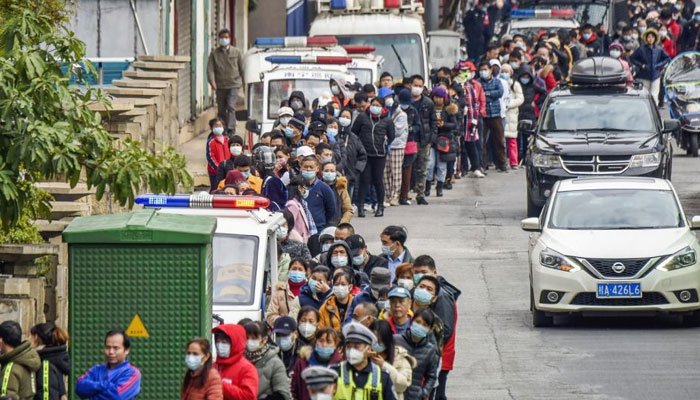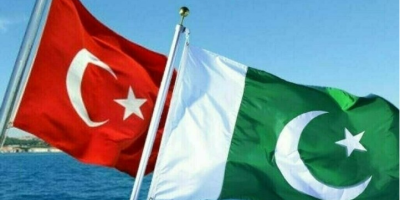China seeks effective coronavirus response following initial ‘shortcomings’

BEIJING, FEB 04 (DNA) : China’s top leadership on Monday admitted “shortcomings and difficulties” in its response to the coronavirus outbreak, as state media said a new hospital built at breakneck pace began receiving patients in the epicentre of the crisis.
Fifty-seven new deaths were confirmed on Monday — the single-biggest daily increase since the virus was detected late last year in the central city of Wuhan.
The death toll in China stood at 361, exceeding the 349 mainland fatalities from the Severe Acute Respiratory Syndrome (SARS) outbreak of 2002-03, which eventually killed nearly 800.
The government in Beijing nevertheless hit out at the United States for sparking “panic” with its response to the coronavirus, including a ban on foreigners who have recently been to China.
The virus has so far spread to more than 20 countries, and several other nations have instituted similarly tough travel rules.
The World Health Organisation has declared the crisis a global health emergency, and the first death outside China was confirmed in the Philippines on Sunday.
China’s elite Politburo Standing Committee called for improvements to the “national emergency management system” following “shortcoming and difficulties exposed in the response to the epidemic.
“It is necessary to strengthen market supervision, resolutely ban and severely crack down on illegal wildlife markets and trade,” it added.
The government also said it “urgently” needed medical equipment and surgical masks, protective suits, and safety goggles as it battles to control the outbreak.
Authorities in provinces that are home to more than 300 million people — including Guangdong, the country´s most populous in south China — have ordered everyone to wear masks in public.
But factories capable of producing around 20 million masks a day are only operating at 60-70 per cent of capacity, industry department spokesman Tian Yulong said, adding that supply and demand remained in “tight equilibrium” as a result of the Lunar New Year break.
Tian said authorities were taking steps to bring in masks from Europe, Japan and the United States, while the foreign ministry said countries including South Korea, Japan, Kazakhstan and Hungary had donated medical supplies.
Hospital open for business
All but one of the 57 new deaths reported Monday were in Wuhan and the rest of surrounding Hubei province, most of which has been under lockdown for almost two weeks.
With 17,200 confirmed infections, the mortality rate for the new coronavirus is around 2.1 per cent, compared with 9.6 per cent for SARS.
In Wuhan, where the virus is believed to have jumped from animals at a market into humans, authorities has been racing to build two new hospitals to treat the infected.
The first of those — a 1,000-bed facility — “began to receive” patients Monday, just 10 days after construction began, but no details were offered about how many.
The second hospital is due to open later this week.
Economic woes
The virus is taking an increasing economic toll, shutting down businesses, curbing international travel and impacting production lines of major global brands.
The Shanghai stock market plunged almost eight per cent Monday on the first day of trading since the holiday as investors played catch-up with last week’s global retreat.
But on Wall Street, stocks rebounded, with the Dow Jones industrial average gaining 0.5 per cent.
In Wuhan, which has been transformed from a bustling industrial hub into a near-ghost town, residents have been living in deep fear of catching the virus.
The city’s medical facilities have been overwhelmed, 68 medical teams of 8,300 staff had been sent to Hubei.
Travel curbs
The emergence of the virus coincided with the Lunar New Year, when hundreds of millions travel across the country for family reunions.
Originally scheduled to end last Friday, the holiday was extended by three days to give authorities more time to deal with the crisis.
But some major cities — including Shanghai — extended it again, and many schools and universities have delayed the start of new terms.
Road, train and air traffic were all way down on Sunday, when hundreds of millions of people would have been expected to return to their cities of work, the transport ministry said.
Many companies offered staff the option to work from home or defer travel, or simply remained closed.
Stopping the spread
Many nations have evacuated hundreds of their citizens from China — with some forcing them into quarantine on their return — and more airlines are cancelling services to the mainland.
China’s foreign ministry on Monday criticised the United States for being among the first to evacuate nationals without providing “substantial assistance” to China.
The US actions had caused “panic”, said spokeswoman Hua Chunying.
Mongolia, Russia and Nepal have closed their land borders, while semi-autonomous Hong Kong announced Monday it was closing all but two land crossings.
Also on Monday, the Cruise Lines International Association, which represents some of the world´s largest operators, said vessels will deny boarding to passengers and crew who have recently travelled to China.
Related News

PPPP delegation visits Iranian embassy, condemns Israeli aggression
ISLAMABAD, Jul 3 (APP/DNA):A senior delegation of the Pakistan Peoples Party Parliamentarians (PPPP) led byRead More

Pakistan, Turkiye vow to deepen cooperation in religious education, welfare initiatives
ISLAMABAD, July 03 (APP/DNA):Federal Minister for Religious Affairs and Interfaith Harmony, Sardar Muhammad Yousaf onRead More


Comments are Closed